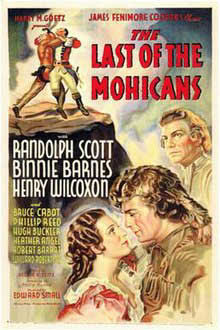
Director:
George Seitz
Year: 1975
Rating: 7.5
Year: 1975
Rating: 7.5
By the time this version of the James Fenimore
Cooper novel came to the screen there had already been four American adaptations.
There were more to come including of course the popular 1992 version directed
by Michael Mann. Mann was to say that he took this film as the basis for
his film rather than going back to the original book. Thankfully. I have
read a bit of Cooper and he must have gotten paid by the word. He goes off
in all sorts of directions and twist after twist. In the book the main protagonist
gets captured and escapes multiple times as does everyone else. In the book
he disguises himself as a bear on a few occasions to fool the Natives. I
don't think so. This film cuts out much of that and keeps it to a 90-minute
rousing tale of adventure, courage, sacrifice, honor, patriotism with a smidgeon
of romance thrown in for good measure.
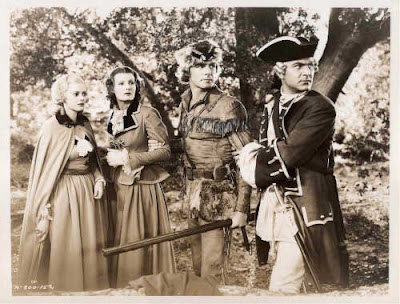
I thought this was terrific - much better than I was expecting - as it never relents in the action or tension. Now times are changing - the Mann version had Native Americans playing the Indians - back in 1936? Not a chance. The Native Americans are a mix - the Mohicans (well the last two left) are proud and honorable while the Hurons are deceitful and sadistic. Which is how the book portrayed them. But to some degree so has history as the historical events around our group of characters is basically true.
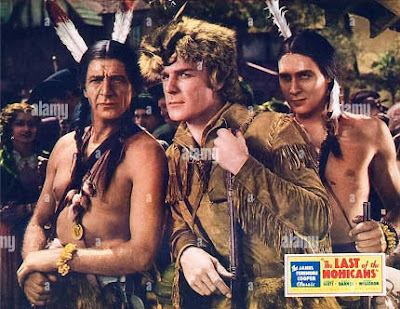
Back in 1757 England and France were engaged in what was later called The Seven Years' War and that had stretched to North America. In America the fighting was called the French and Indian War and most of it centered up around the current border. The English under General Monro had garrisoned Fort William Henry on Lake George. The French under General Montcalm in 1757 laid siege to it with many more soldiers, canon and their allied Native Americans, the Hurons and others. No reinforcements arrived for the British (the General who refused them was later booted out) and so after six days they surrendered under certain terms. That they could leave under French protection, leave their ammunition behind and promise not to fight again for 18 months. But the Hurons broke the terms and slaughtered hundreds of them including women. So they get the bad rep in the book. Around these events Cooper wrote his book. It was the second of five in the Leatherstocking Tales featuring Hawk-Eye aka the Deerslayer aka Natty Bumppo aka Pathfinder.
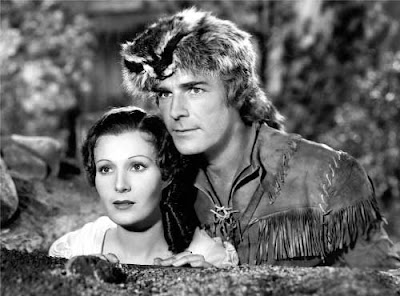
Here he is portrayed by a rugged manly Randolph Scott while his two Native American friends are the older Mohican Chingachgook (Robert Barrat) and the younger one Ubcas (Phillip Reed). The East Germans made a film about Chingachgook in 1967 and none other than Bela Lugosi played him twice in two silent German films. How great would those be to see. The evil Huron leader is played by Bruce Cabot, who usually plays a villainous white guy. Always the villain. General Monro's two daughters join him at the fort - Alice (Binnie Barnes) and Cora (Heather Angel). Hawk-Eye tries to warn them that it is no place for women but of course he isn't listened to because he is nearly a "native savage" himself proclaims Major Hayward just arrived from England who carries the typical English superiority and arrogance with him like a badge of honor. Played by Henry Wilcoxon right after playing King Richard in The Crusades and Antony in Cleopatra. So a demotion for him. I think the gist of the rest of the film is well-known if you have seen the 1992 version and who hasn't.
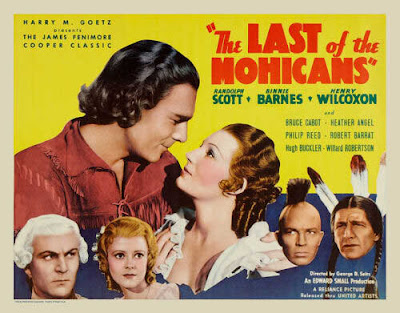

I thought this was terrific - much better than I was expecting - as it never relents in the action or tension. Now times are changing - the Mann version had Native Americans playing the Indians - back in 1936? Not a chance. The Native Americans are a mix - the Mohicans (well the last two left) are proud and honorable while the Hurons are deceitful and sadistic. Which is how the book portrayed them. But to some degree so has history as the historical events around our group of characters is basically true.

Back in 1757 England and France were engaged in what was later called The Seven Years' War and that had stretched to North America. In America the fighting was called the French and Indian War and most of it centered up around the current border. The English under General Monro had garrisoned Fort William Henry on Lake George. The French under General Montcalm in 1757 laid siege to it with many more soldiers, canon and their allied Native Americans, the Hurons and others. No reinforcements arrived for the British (the General who refused them was later booted out) and so after six days they surrendered under certain terms. That they could leave under French protection, leave their ammunition behind and promise not to fight again for 18 months. But the Hurons broke the terms and slaughtered hundreds of them including women. So they get the bad rep in the book. Around these events Cooper wrote his book. It was the second of five in the Leatherstocking Tales featuring Hawk-Eye aka the Deerslayer aka Natty Bumppo aka Pathfinder.

Here he is portrayed by a rugged manly Randolph Scott while his two Native American friends are the older Mohican Chingachgook (Robert Barrat) and the younger one Ubcas (Phillip Reed). The East Germans made a film about Chingachgook in 1967 and none other than Bela Lugosi played him twice in two silent German films. How great would those be to see. The evil Huron leader is played by Bruce Cabot, who usually plays a villainous white guy. Always the villain. General Monro's two daughters join him at the fort - Alice (Binnie Barnes) and Cora (Heather Angel). Hawk-Eye tries to warn them that it is no place for women but of course he isn't listened to because he is nearly a "native savage" himself proclaims Major Hayward just arrived from England who carries the typical English superiority and arrogance with him like a badge of honor. Played by Henry Wilcoxon right after playing King Richard in The Crusades and Antony in Cleopatra. So a demotion for him. I think the gist of the rest of the film is well-known if you have seen the 1992 version and who hasn't.
